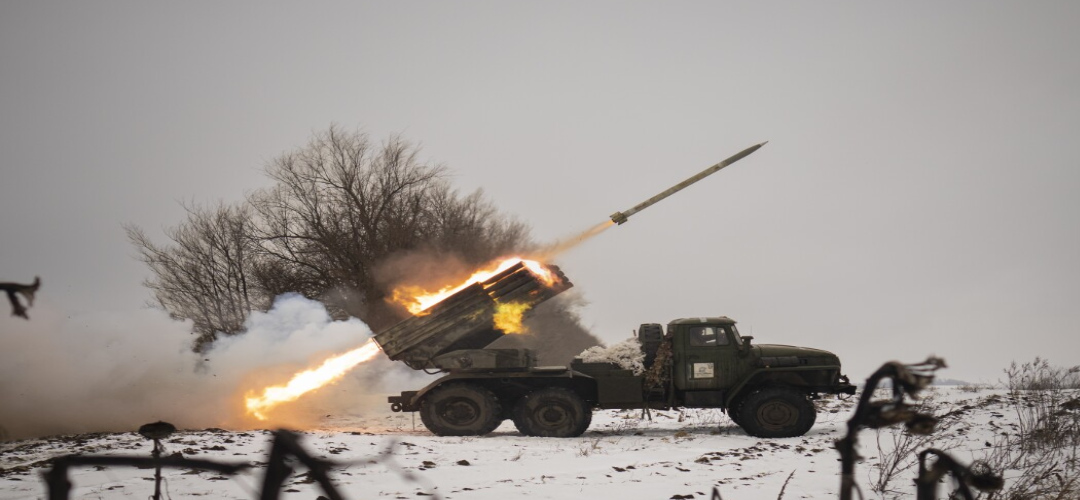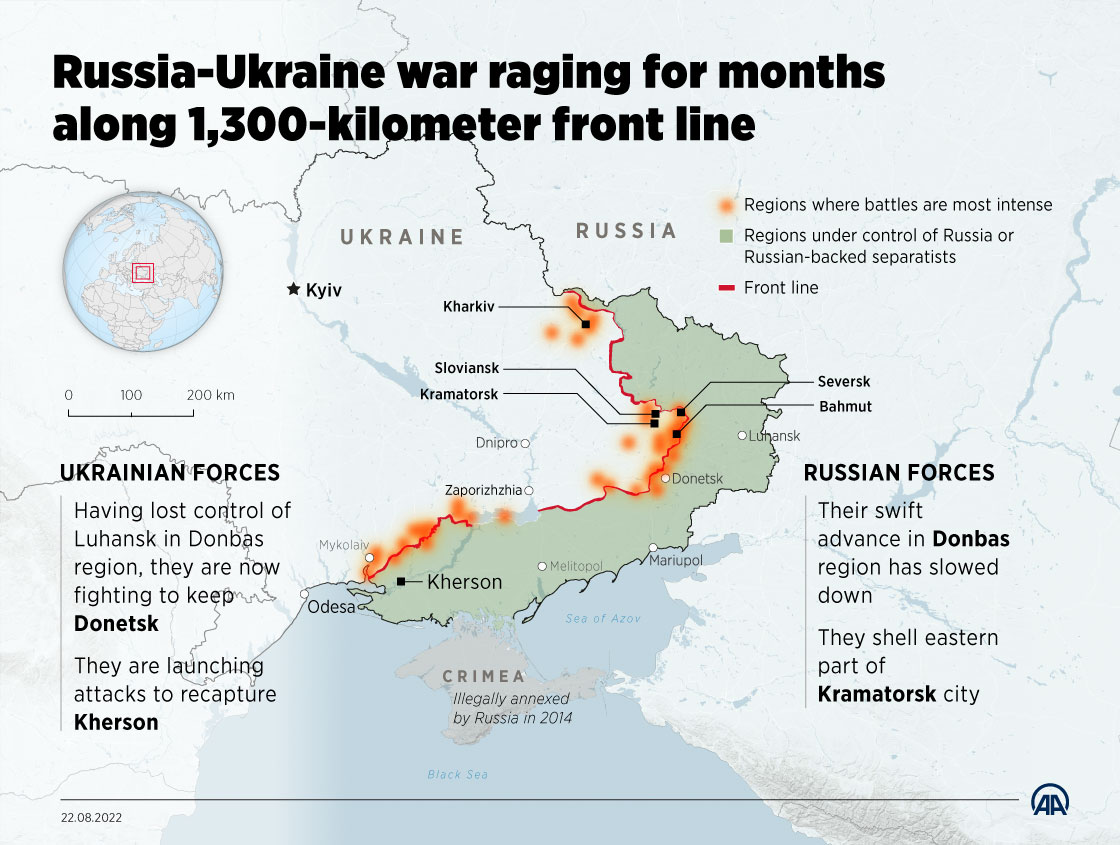A Shadow Over the New Year
January 6, 2024 | Expert Insights

The final week of December 2023 cast a long, dark shadow over the New Year as Russia unleashed its most extensive missile attack on Ukraine since the war. This brutal display of force, concentrated in major cities like Kyiv and Kharkiv, left a trail of devastation and reignited anxieties about the conflict's trajectory.
Just when President Putin was offering Russian citizenship to foreigners who fought in the 'special military operation' along with their families, indicating the drying up of his human resources, this escalation has set alarm bells ringing in Western capitals. Caught by the brutal fighting in Gaza, which has taken up all the time and attention of the Western Capitals who have been supporting Kyiv, Russia may be looking at a decisive surge to force Kyiv into a humiliating peace agreement.
Background
For months, Russia's advance had resembled a lumbering bear trapped in a frozen swamp, its claws of ambition blunted by the unyielding Ukrainian resistance. Inside the Kremlin, frustration festered like an open wound, the phantom victories promised by propaganda replaced by the harsh reality of stalled progress. Then came the spark, a searing ember fanned into a blaze by the drone attack on Belgorod, which killed over 20 Russians. This assault ripped at the fabric of trust. Negotiations lay in tatters, diplomatic threads severed by suspicion and anger.
At least 31 civilians died in Ukraine; countless others were wounded. Apartment buildings were reduced to smouldering tombs, mocking the normalcy they once cradled. Hospitals, schools, and the very arteries of essential infrastructure were crippled, leaving Ukrainians gasping for the necessities of survival. Beyond the immediate physical devastation, a deeper crisis festered. Power outages plunged entire cities into an abyss of darkness, severing the vital threads of communication and commerce. Water, the lifeblood of existence, sputtered to a halt, leaving residents scrambling for sustenance. Transportation, the veins carrying people to safety and services, lay wounded, hindering movement and access to critical care.
The psychological toll was perhaps the most insidious. The attack shattered any semblance of normalcy, plunging Ukrainians back into a chilling state of fear and uncertainty. Children, especially vulnerable to the trauma's insidious tendrils, face a particularly agonizing struggle to cope with the echoes of violence. The United Nations Office for the Coordination of Humanitarian Affairs (OCHA) estimates that over 250 buildings, from homes to hospitals to cultural landmarks, lay in ruin. The World Bank calculates the staggering cost at over $1 billion in infrastructural damage alone. The World Food Programme reports that the attack disrupted the lifeline of food and aid deliveries to vulnerable populations, leaving many teetering on the precipice of starvation.
Leaders from across the political spectrum voiced their outrage, with many framing the attack as a blatant violation of international law and a potential war crime. UN Secretary-General Antonio Guterres expressed his "deepest concern" about the attack, stating it "violates the principles of the UN Charter and international humanitarian law." He urged Russia to "cease its attacks on civilian objects and infrastructure immediately" and called for "accountability for all violations of international law." The European Union condemned the attack in the strongest terms, calling it "a barbaric act of aggression." EU leaders pledged to increase military and humanitarian support for Ukraine and reiterated their call for Russia to cease hostilities and engage in meaningful peace talks. The United States and other Western nations echoed these sentiments, imposing additional sanctions on Russia and pledging further military and humanitarian aid to Ukraine. President Biden of the United States called the attack "an outrage against humanity" and vowed to hold Russia accountable for its actions.
Beyond official condemnation, the attack also sparked outrage and concern from civil society groups and ordinary citizens worldwide. Protests against the war were held in major cities across the globe, and social media platforms were flooded with messages of solidarity with Ukraine.

Analysis
The attack's attribution to Ukrainian forces could fuel Russian paranoia and justify even more aggressive actions. This, in turn, could draw in other countries, particularly those with close ties to Ukraine, potentially escalating the conflict into a wider regional war. The spectre of a proxy war between major powers, with devastating consequences for the entire world, becomes a terrifying possibility in this scenario.
There is another side to the story. Did Kyiv deliberately provoke Moscow to get the focus back on the war in Ukraine? Moscow was unambiguous in its justification for its massive attack, which it said was in retaliation against Ukrainian strikes on the Russian border city of Belgorod, which killed at least 24 people. If it was the attention that Kyiv craved, then surely, they have got it, albeit in measures way beyond what they may have expected.
However, despite the near-unanimous condemnation, the international community's response also highlighted the limitations of global intervention. While sanctions and condemnation can exert pressure on Russia, they have not been enough to halt the war or deter further escalation. The ongoing conflict exposes the fragility of the international order and the challenges of addressing complex geopolitical issues in a multipolar world.
Predicting the future course of the war in Ukraine remains a fool's errand. The December attack has served as a stark reminder of the war's volatility and the fragility of any potential resolutions.
Assessment
- The choices made by Russia, Ukraine, and the international community in the coming weeks and months will hold immense weight, determining whether the war spirals into further darkness or flickers towards a fragile hope of peace. The world watches with bated breath as the fate of Ukraine and, perhaps, the global order itself hangs in the balance.
- Predicting the future course of the war remains difficult, and despite the massive losses on both sides, neither is showing any inclination to throw in the gloves. One thing is clear: the December attack has cast a long shadow over the conflict, and its ramifications will be felt for years to come.
- Only through sustained pressure and global cooperation can we hope to bring an end to this devastating war and prevent further tragedies. Of course, concessions will have to be made on both sides, including addressing Russian grievances in a credible manner.








Comments